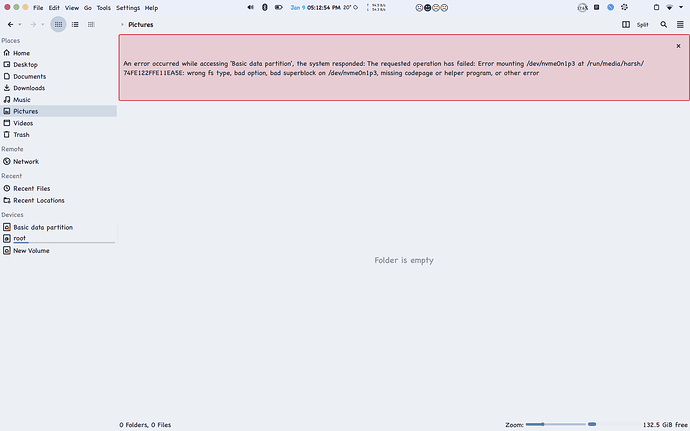whenever i want to access the windows partition it is showing me An error occurred while accessing 'Basic data partition', the system responded: The requested operation has failed: Error mounting /dev/nvme0n1p3 at /run/media/harsh/74FE122FFE11EA5E: wrong fs type, bad option, bad superblock on /dev/nvme0n1p3, missing codepage or helper program, or other error.
System:
Kernel: 6.6.8-2-MANJARO arch: x86_64 bits: 64 compiler: gcc v: 13.2.1
clocksource: tsc available: acpi_pm
parameters: BOOT_IMAGE=/boot/vmlinuz-6.6-x86_64
root=UUID=ae935713-3636-423f-8804-43ca0faf5eb0 rw quiet splash
udev.log_priority=3
Desktop: KDE Plasma v: 5.27.10 tk: Qt v: 5.15.11 wm: kwin_x11 vt: 2
dm: SDDM Distro: Manjaro Linux base: Arch Linux
Machine:
Type: Laptop System: LENOVO product: 83BF v: IdeaPad Slim 5 14IAH8
serial: <superuser required> Chassis: type: 10 v: IdeaPad Slim 5 14IAH8
serial: <superuser required>
Mobo: LENOVO model: LNVNB161216 v: SDK0T76485 WIN
serial: <superuser required> UEFI: LENOVO v: LACN29WW date: 09/01/2023
Battery:
ID-1: BAT1 charge: 31.6 Wh (55.2%) condition: 57.2/56.6 Wh (101.0%)
power: 47.9 W volts: 12.3 min: 11.5 model: LGES L22L3PA4 type: Unknown
serial: <filter> status: charging
Device-1: hidpp_battery_0 model: Logitech Wireless Mouse serial: <filter>
charge: 50% (should be ignored) rechargeable: yes status: N/A
CPU:
Info: model: 12th Gen Intel Core i5-12450H bits: 64 type: MST AMCP
arch: Alder Lake gen: core 12 level: v3 note: check built: 2021+
process: Intel 7 (10nm ESF) family: 6 model-id: 0x9A (154) stepping: 3
microcode: 0x430
Topology: cpus: 1x cores: 8 mt: 4 tpc: 2 st: 4 threads: 12 smt: enabled
cache: L1: 704 KiB desc: d-4x32 KiB, 4x48 KiB; i-4x32 KiB, 4x64 KiB L2: 7 MiB
desc: 4x1.2 MiB, 1x2 MiB L3: 12 MiB desc: 1x12 MiB
Speed (MHz): avg: 498 high: 879 min/max: 400/4400:3300 scaling:
driver: intel_pstate governor: powersave cores: 1: 400 2: 400 3: 400 4: 400
5: 656 6: 400 7: 850 8: 400 9: 879 10: 400 11: 400 12: 400 bogomips: 59916
Flags: avx avx2 ht lm nx pae sse sse2 sse3 sse4_1 sse4_2 ssse3 vmx
Vulnerabilities:
Type: gather_data_sampling status: Not affected
Type: itlb_multihit status: Not affected
Type: l1tf status: Not affected
Type: mds status: Not affected
Type: meltdown status: Not affected
Type: mmio_stale_data status: Not affected
Type: retbleed status: Not affected
Type: spec_rstack_overflow status: Not affected
Type: spec_store_bypass mitigation: Speculative Store Bypass disabled via
prctl
Type: spectre_v1 mitigation: usercopy/swapgs barriers and __user pointer
sanitization
Type: spectre_v2 mitigation: Enhanced / Automatic IBRS, IBPB: conditional,
RSB filling, PBRSB-eIBRS: SW sequence
Type: srbds status: Not affected
Type: tsx_async_abort status: Not affected
Graphics:
Device-1: Intel Alder Lake-P GT1 [UHD Graphics] vendor: Lenovo driver: i915
v: kernel arch: Gen-12.2 process: Intel 10nm built: 2021-22+ ports:
active: eDP-1 empty: DP-1,DP-2,HDMI-A-1 bus-ID: 00:02.0 chip-ID: 8086:46a3
class-ID: 0300
Device-2: Chicony Integrated Camera driver: uvcvideo type: USB rev: 2.0
speed: 480 Mb/s lanes: 1 mode: 2.0 bus-ID: 3-5:3 chip-ID: 04f2:b7b9
class-ID: fe01 serial: <filter>
Display: x11 server: X.Org v: 21.1.10 compositor: kwin_x11 driver: X:
loaded: modesetting alternate: fbdev,vesa dri: iris gpu: i915 display-ID: :0
screens: 1
Screen-1: 0 s-res: 1920x1200 s-dpi: 96 s-size: 508x317mm (20.00x12.48")
s-diag: 599mm (23.57") monitors: <missing: xrandr>
Monitor-1: eDP-1 model: ChiMei InnoLux 0x1457 built: 2022 res: 1920x1200
dpi: 162 gamma: 1.2 size: 301x188mm (11.85x7.4") diag: 355mm (14")
ratio: 16:10 modes: 1920x1200
API: EGL v: 1.5 hw: drv: intel iris platforms: device: 0 drv: iris
device: 1 drv: swrast surfaceless: drv: iris x11: drv: iris
inactive: gbm,wayland
API: OpenGL v: 4.6 compat-v: 4.5 vendor: intel mesa v: 23.1.9-manjaro1.1
glx-v: 1.4 direct-render: yes renderer: Mesa Intel Graphics (ADL GT2)
device-ID: 8086:46a3 memory: 14.99 GiB unified: yes
API: Vulkan v: 1.3.274 layers: N/A device: 0 type: integrated-gpu
name: Intel Graphics (ADL GT2) driver: mesa intel v: 23.1.9-manjaro1.1
device-ID: 8086:46a3 surfaces: xcb,xlib
Audio:
Device-1: Intel Alder Lake PCH-P High Definition Audio vendor: Lenovo
driver: snd_hda_intel v: kernel alternate: snd_sof_pci_intel_tgl
bus-ID: 00:1f.3 chip-ID: 8086:51c8 class-ID: 0403
API: ALSA v: k6.6.8-2-MANJARO status: kernel-api with: aoss
type: oss-emulator tools: alsactl,alsamixer,amixer
Server-1: JACK v: 1.9.22 status: off tools: N/A
Server-2: PipeWire v: 1.0.0 status: active with: 1: pipewire-pulse
status: active 2: wireplumber status: active 3: pipewire-alsa type: plugin
tools: pactl,pw-cat,pw-cli,wpctl
Network:
Device-1: Realtek RTL8852BE PCIe 802.11ax Wireless Network vendor: Lenovo
driver: rtw89_8852be v: kernel pcie: gen: 1 speed: 2.5 GT/s lanes: 1
port: 3000 bus-ID: 03:00.0 chip-ID: 10ec:b852 class-ID: 0280
IF: wlp3s0 state: up mac: <filter>
Bluetooth:
Device-1: Realtek Bluetooth Radio driver: btusb v: 0.8 type: USB rev: 1.0
speed: 12 Mb/s lanes: 1 mode: 1.1 bus-ID: 3-10:4 chip-ID: 0bda:4853
class-ID: e001 serial: <filter>
Report: rfkill ID: hci0 rfk-id: 2 state: up address: see --recommends
Drives:
Local Storage: total: 476.94 GiB used: 95.5 GiB (20.0%)
SMART Message: Unable to run smartctl. Root privileges required.
ID-1: /dev/nvme0n1 maj-min: 259:0 vendor: Western Digital model: WD PC
SN740 SDDPMQD-512G-1101 size: 476.94 GiB block-size: physical: 512 B
logical: 512 B speed: 63.2 Gb/s lanes: 4 tech: SSD serial: <filter>
fw-rev: 73110001 temp: 37.9 C scheme: GPT
Partition:
ID-1: / raw-size: 160 GiB size: 156.43 GiB (97.77%) used: 16 GiB (10.2%)
fs: ext4 dev: /dev/nvme0n1p5 maj-min: 259:5
ID-2: /boot/efi raw-size: 100 MiB size: 96 MiB (96.00%)
used: 35.7 MiB (37.2%) fs: vfat dev: /dev/nvme0n1p1 maj-min: 259:1
Swap:
Alert: No swap data was found.
Sensors:
System Temperatures: cpu: 39.0 C mobo: N/A
Fan Speeds (rpm): N/A
Info:
Processes: 278 Uptime: 9m wakeups: 0 Memory: total: 16 GiB note: est.
available: 15.35 GiB used: 3.21 GiB (20.9%) Init: systemd v: 254
default: graphical tool: systemctl Compilers: gcc: 13.2.1 clang: 16.0.6
Packages: pm: pacman pkgs: 1181 libs: 347 tools: pamac,yay pm: flatpak
pkgs: 0 Shell: Zsh v: 5.9 default: Bash v: 5.2.21 running-in: konsole
inxi: 3.3.31
